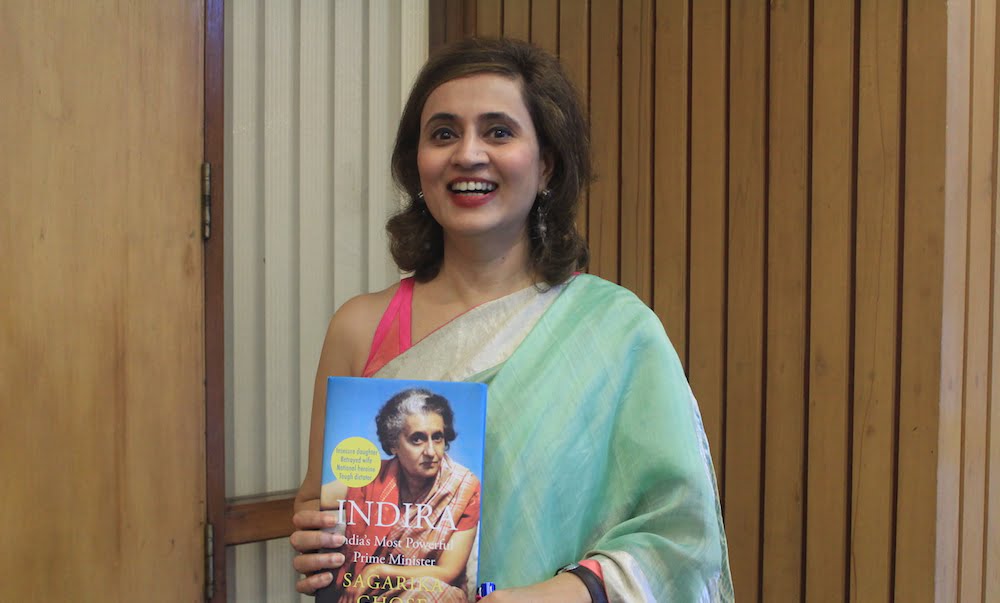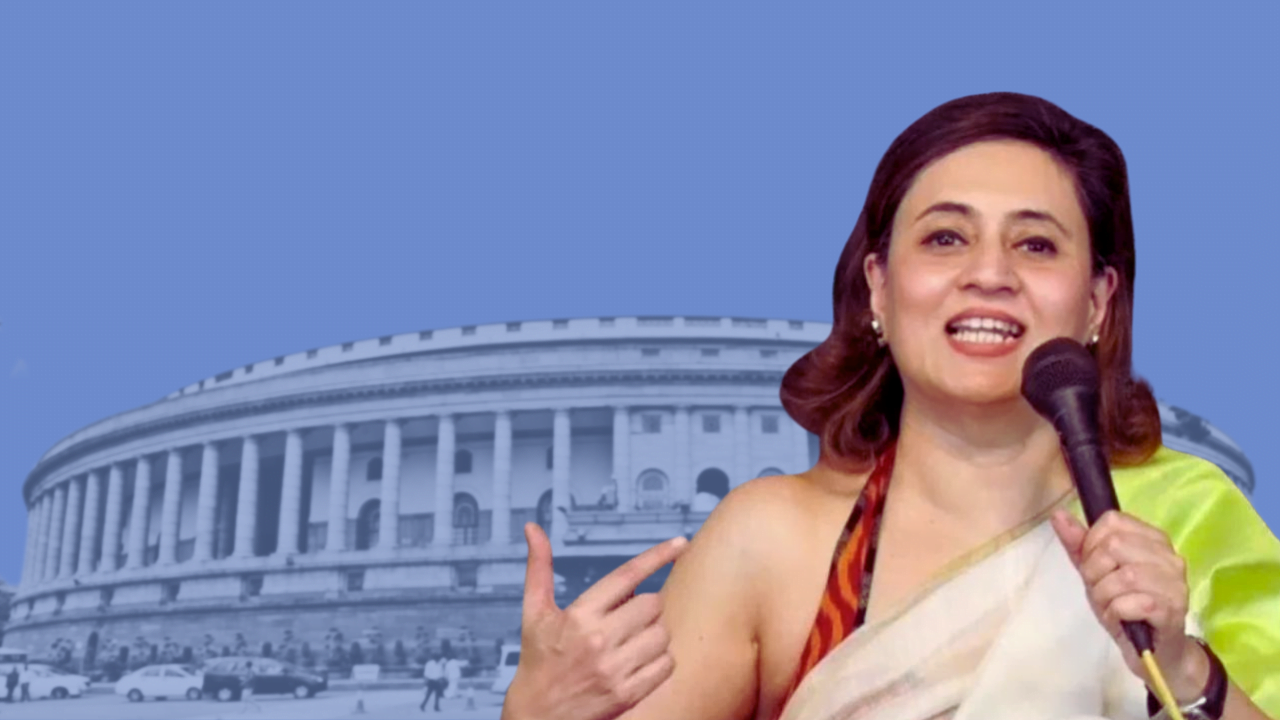Journalist Sagarika Ghose has made a surprise lateral entry into politics by being one of Trinamool Congress’ four newly-elected Rajya Sabha members. The first-time nominee turned heads and also gained scrutiny for her sudden political involvement. While her writing has always carried a strong political message, she has long been a critic of the melding of media with politics.
Born in 1964, Sagarika Ghose completed her early education at Delhi Public School, R K Puram following which she pursued a Bachelor’s degree in History at St. Stephen’s College, Delhi. The daughter of the former Secretary of the Ministry of Information and Broadcasting and former Director General of Doordarshan, Bhaskar Ghose, she belongs to a family of well-known high-ranking civil servants.
In 1987, she received a Rhodes scholarship and obtained an M. Phil. in Modern History from Oxford. She began her journalistic career in 1991, as a writer for Times of India (TOI). She also wrote for The Outlook and The Indian Express before she entered broadcast television in 2004, as a prime-time anchor on BBC. She also hosted Question Time India on BBC World. Soon after, she joined CNN-IBN where she was the deputy editor and a prime-time anchor.
CNN-IBN and subsequent career shifts
Sagarika Ghose’s time at CNN-IBN was illustrious for her career. It led her to win several awards including the Best Anchor Award from the Indian Television Academy and National Television Award for Best Public Debate Show. It is here that she had one of her first prominent conversations with Trinamool Congress chairperson and leader, Mamata Banerjee during an exclusive program called ‘Question Time Mamata’ which examined her first year in power. Two years later, they spoke again for ‘Question Time Didi,’ a program of similar intentions through a town hall, during which Banerjee stormed out of the interview, offended by a question asked by an audience member.
In 2012, Mukesh Ambani’s Reliance set in motion their deal to acquire Network 18 (which owned CNN-IBN). This put pressure on Ghose whose reporting was critical of the BJP & Narendra Modi. She was simultaneously also receiving pressure online from BJP supporters for the same as well as her outspokenness against the party. It gradually becomes a difficult position for her to be in with regard to press freedom.
In July 2012, following a month-long break, both she and her husband, who was the Editor-in-Chief at CNN-IBN, tendered their resignations.
Shortly after, she joined the TOI again as a consulting editor. She still writes for TOI and is also a political commentator on ET Now. She also authored several books including ‘Indira: India’s Most Powerful Prime Minister in 2017,’ ‘Why I Am a Liberal: A Manifesto for Indians Who Believe in Individual Freedom,’ in 2018, and most recently, an eponymous biography of Atal Bihari Vajpayee in 2021.
Sagarika Ghose’s political outlook– through reportage
Sagarika Ghose, through her work and especially through her tweets, is incredibly outspoken against the Indian Right Wing. In a 2012 interview with Newlaundry’s Madhu Trehan, she said she supports a liberal democrat ideology but not any particular political party. Her writing has sustained to contain the same political strand covering criticism of Indian democracy. She has also spoken out about the endangerment of press freedom.

However, she does preach a strand of so-called secular Hinduism or liberal Hinduism. She describes it, in an op-ed article published by TOI as a “joyful aesthetic religion” of “culture-soaked joie de vivre, of sindoor, jasmine and marigolds” where she praises the goods of Hinduism that the world fell in love with before it was tarnished by Hindutva. Thus, her image can be seen as slightly sanitised, what the right calls ‘Lutyens Journalism.’
She is incredibly active on X (formerly Twitter) where she has over 4 million followers and is often seen debating her adversaries. Most recently, she posted a video on both X and Instagram, defending Trinamool Congress against BJP’s attacks on TMC’s handling of the injustices happening in Sandeshkhali. In the video, she says, “to now call for president’s rule in Bengal is nothing but an attempt to destabilize a popular and delivery oriented government in Bengal which is pro-woman until its last breath,” although nothing is said about what the party plans to do to the accused party member involved.
Ghose has previously also been outspoken about Modi’s favouring of Arnab Goswami and Smriti Irani’s defence of Arun Jaitley during the DDCA controversy, amongst other issues. Much of her platform is dedicated to the criticism of BJP policies & actions. Her outspokenness and ‘anti-nationalism‘ has even led to her receiving serious threats online in 2017.
Surprise Rajya Sabha candidature
Sagarika Ghose’s entry into politics happened almost overnight and not without controversy. Her nomination was announced on 11th February alongside three other candidates and the candidates filed their nominations four days later. Ghose has since maintained her pride in being part of a woman-led party.
In her response to her nomination on an X post, she said “I remain inspired by the formidable courage of @MamataOfficial, India’s only woman chief minister. My commitment to constitutional democratic values remains unflinching.”
However, controversy has swarmed her since the nomination announcement questioning her integrity for participating in politics as a journalist. While no bar prevents journalists from turning into politicians or holding office, one does question the objectivity– which is expected from any journalist– they can provide any longer.
Adding fuel to the fire, Ghose and her husband Sardesai’s comments, made much earlier, against the involvement of media persons with politics resurfaced. She responded a day later saying:
“My tweet from 6 years ago ( 2018) is being widely circulated. At the time I was a working journalist and yes it would have been inappropriate for me at that time to switch overnight to party politics. However in 2020 I ceased to be a full time journalist and for the last 3 years have been a freelance columnist for different newspapers. 1/2
I have therefore had a 3 year cooling off period from full time journalism before taking the plunge into public life. Today when an increasingly authoritarian Modi government recognises no institutional restraints and has almost entirely captured the media, my commitment to constitutional democracy has led me to join the courageous fight of @AITCofficial to keep alive democratic spaces and democratic contestation.”
While Ghosh responds as such, it is to be noted that Ghose was potentially chosen by TMC for her media affiliation and pre-existing, established connections in Delhi. Santanu Chowdhury, in an article responding to Ghose’s nomination, speculates that “she, like Derek O’Brien, will likely be the party’s voice in national media.” Her consistent anti-BJP stance aligns with the party’s standing.
A TMC member even revealed that the decision to bring Ghosh in did not happen overnight but was in the works for two years now; which would explain her gradual distancing from full-time journalism.
On the 20th of February, less than ten days after her candidature announcement, Ghose was elected into the Rajya Sabha alongside her fellow nominees as they all ran unopposed. Trinamool Congress took to Twitter to announce the same while promoting their ideology of a women-centric and inclusive spirit in “the fight against the BJP zamindars” and the betterment of the nation.
As this is Sagarika Ghose’s first stint in the political world, we will have to wait to witness her performance in the role of the people she once saw from the other side.
About the author(s)
Spoorthi is a material feminist, academically rooted in cultural studies. She enjoys analyzing films and applying feminist critique to media & media structures.





